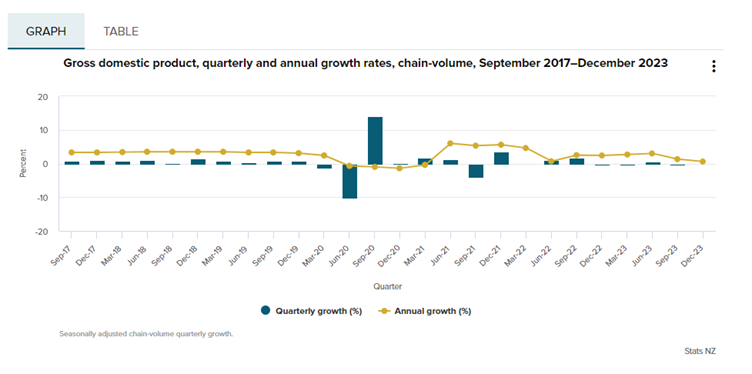Economy shrank 0.1% in December quarter

New Zealand is in a double-dip recession after its economy shrank for two quarters in a row, which signals a period of decline in economic activity.
The country’s gross domestic product (GDP) dropped by 0.1% in the December 2023 quarter, following a 0.3% decrease in the September 2023 quarter, according to figures released by Stats NZ today.

“Wholesale trade was the largest downwards driver this quarter, led by falls in grocery and liquor wholesaling; and machinery and equipment wholesaling,” said Ruvani Ratnayake (pictured above), national accounts industry and production senior manager at Stats NZ.
Retail trade activity also fell, driven by furniture, electrical, and hardware retailing; and food and beverage services.
Results at industry level were mixed – eight out of 16 industries increased, driven by rental, hiring, and real estate services; and public administration, safety, and defence.
“Increased activity associated with the NZ General Election contributed to growth in public administration, safety, and defence,” said Ratnayake.
The expenditure measure of GDP was flat in the December 2023 quarter. Rising net exports (exports less imports) had an upwards contribution to expenditure, while a rundown in retail and wholesale inventories offset this.
Household spending grew 0.5%, led by a rise in spending on services, primarily transport. Consumption of non-durables was down due to reduced spending on alcoholic beverages and petrol.
GDP per capita decreased by 0.7% in the December 2023 quarter.
The news come after ASB released its Economic Note last week, which showed that despite climbing prices and a growing population, total card spending was down, reflecting subdued consumer confidence and spending patterns.
The measure of GDP income – or GDP(I) – has been introduced in addition to the GDP production, and GDP expenditure measures. The income measure captures components such as wages and salaries earned by employees; profits of businesses ranging from sole traders to larger corporations; taxes paid by businesses; and subsidies received by them. GDP (I) is measured in current prices (not adjusted for inflation) only.
“The GDP income measure will provide our customers with a wider view of the economy,” said Ratnayake.
Quarterly income measure of GDP to go official in March 2024 has more information.
What does a recession mean for your business and clients? Comment below.



